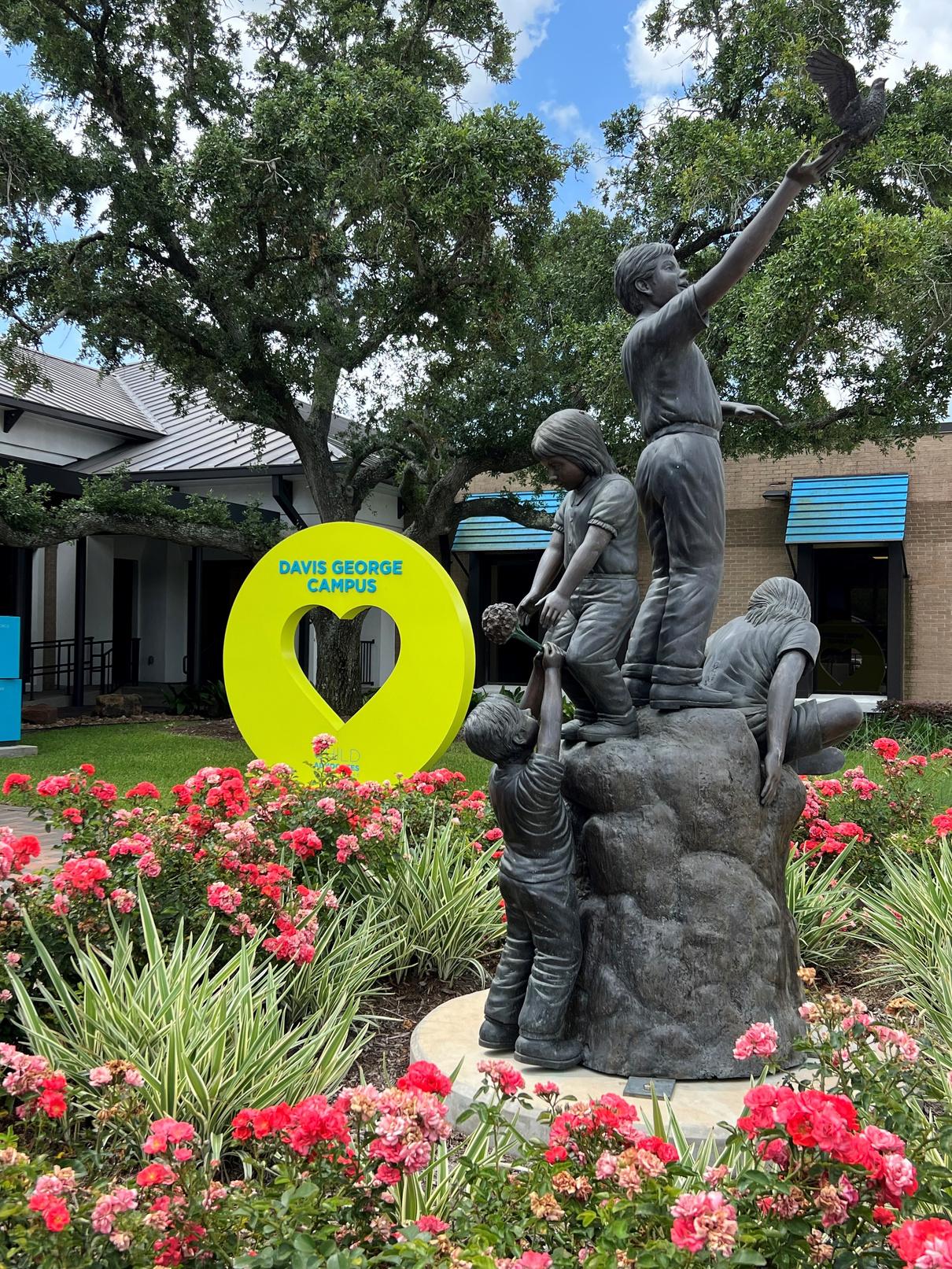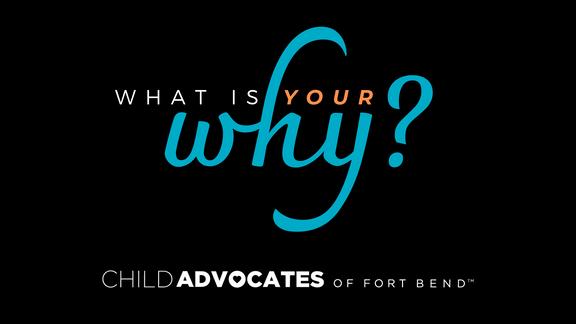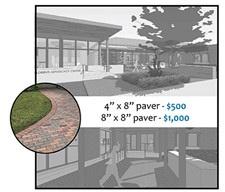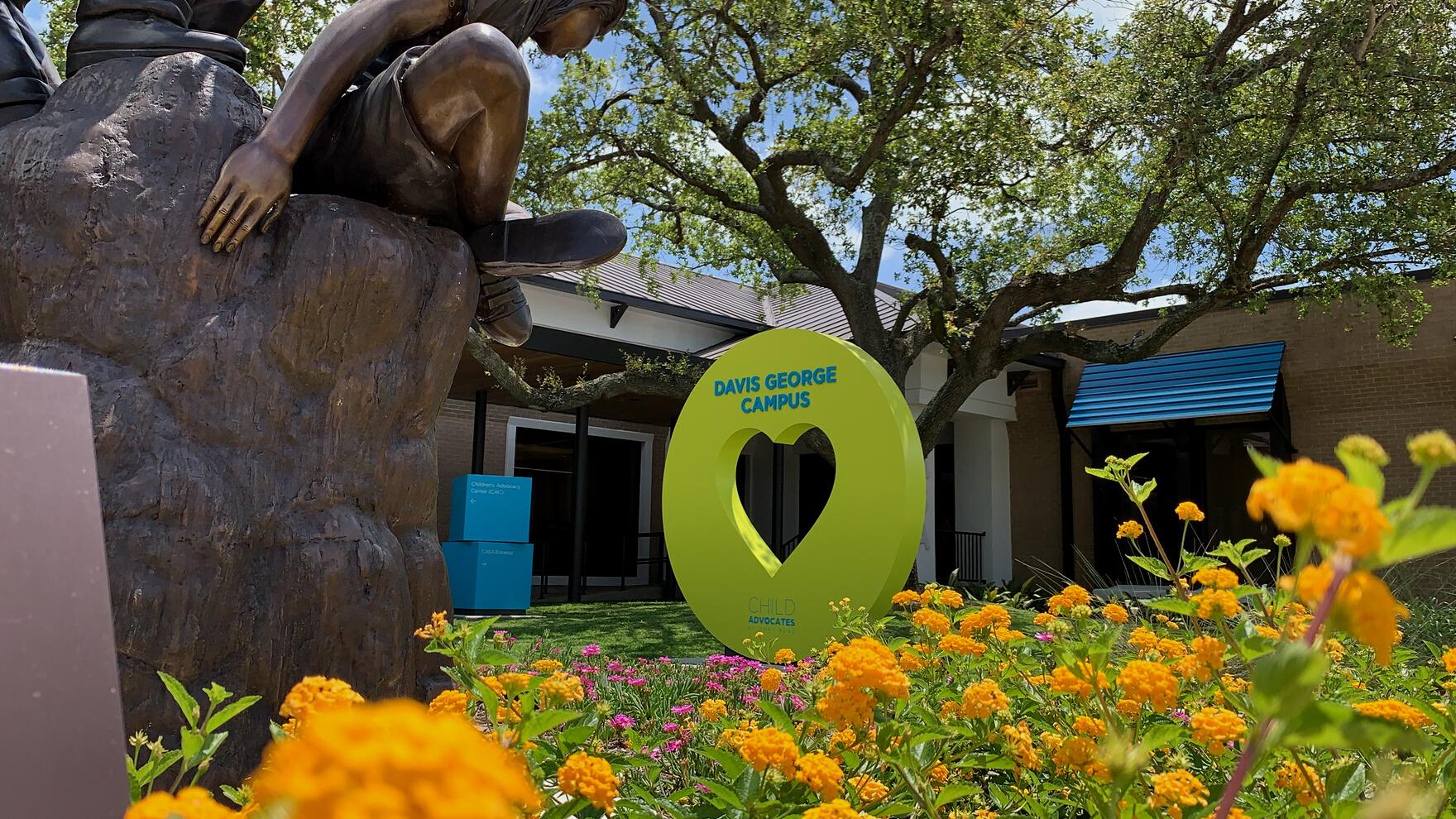The ofVOICES
Inside / Inside / CEO Update • Father's Day CEO Update • Father's Day
• Summmer Safety • And More!
• Summmer Safety • And More!





Inside / Inside / CEO Update • Father's Day CEO Update • Father's Day
• Summmer Safety • And More!
• Summmer Safety • And More!





Thanks for tuning in to our June edition of VOICES. Summer has arrived. . .
Summer has arrived at Child Advocates of Fort Bend and we are excited to have a full lineup of summer activities, enrichment and celebrations for our children. We kick off the month with our NEST Incentive Party on June 9 to honor our elementary children who have achieved their academic and behavioral goals with a wonderful “Level Up” party. On June 17, we will celebrate seniors who are graduating high school, overcoming so many challenges and barriers at our Reach for the Stars Graduation Party. July features a week of Lifeskills and a week of Campus Crawl for our WINGS teenagers. August brings our NEST Summer Enrichment weeklong workshop. Interspersed throughout the summer, we sponsor children and youth to attend summer camps – something that they never could do on their own. We always need volunteers to help out so let us know if you’d ike to be a part of these special activities
lJune is Father’s Day and we honor all our fathers. Fathers play such a critical role in children’s early years and often for children who have been abused or in foster care, fathers may be unknown or absent from these children’s lives. Our Men of CASA Volunteers can fill this gap, provide mentorship and be strong, positive role models for our young boys. Other fathers step up to be foster or adoptive dads. Others volunteer in our CAC by welcoming children who come for a forensic interview or therapy session. Others are owners of therapy dogs who are here every week to provide comfort and support for children going through trauma. And many others are loyal donors and supporters of CAFB. We honor all our dads this Father’s Day and thank you for all you do for our children.
continued next page
June also recognizes the LGBTQ+ community To learn how we serve these children and youth, refer to the article inside
At CAFB, it is important for us to understand the lives and unique challenges of all children Through trauma-informed care including Trust Based Relational Intervention (TBRI), working with family members and youth through Collaborative Family Engagement and Clinical Family Advocacy and cultural competency training, we strive to provide a supportive environment and
safe and stable placements for all children and youth to live, freedom to express themselves and structure and guidance to help them become responsible, healthy adults

Turn the page to learn more about our work, our people and our programs
For the Children's Sake,
Ruthanne Mefford, CEOCollaborative Family Engagement (CFE) meetings and encourage the father’s engagement and participation
The involvement of a father in a child's life contributes to their holistic development, fostering emotional well-being, cognitive abilities, social skills, and healthy relationships. The presence of a loving and supportive father figure lays a foundation for a child's future success and happiness.

It is important to note that the significance of a father's role is not diminished in the absence of a biological connection. Father figures, such as stepfathers, adoptive fathers, or other male role models, can have similar positive impacts on children's lives.
Child Advocates of Fort Bend has many ways in which we support our fathers and male caregivers. We provide resources from partner agencies, such as Depelchin’s Dad Program, to DFPS’s website www.getparentingtips.com/parents. We host
TBRI is one of the tools our CASA team uses to help families understand the effects of traumaRecently in our CASA program, a volunteer attended the TBRI Caregiver training with a family member she was working with This family had recently surrendered their their adoptive daughter due to not being able to take care of her because of behaviors she was exhibiting After attending the TBRI training, this father turned to the volunteer and simply said “ we ’ ve been doing this all wrong ” His eyes were wide open, and in that moment, you could see him gain confidence in himself to help rebuild his family. He attended all four sessions, listened to TBRI podcasts and immersed himself in the TBRI “ way ” of parenting. Armed with the tools he needed, his adoptive daughter was returned earlier this year and the family is connecting in a healthy and productive way.
Research shows that fathers who care for, nurture, and play with their babies raise children with higher IQs and with better language and cognitive skills. The more time fathers spend engaging and stimulating play with their child—such as playing pretend or sharing stories—the better the child’s math and reading scores are at 10 and 11 years old.
Zerotothree.org says “While mothers are more likely to form secure attachments by comforting their children when they are distressed, fathers are more likely to provide
security in the context of the controlled excitement of play or discipline. This helps children learn where the boundaries of safety and risk-taking exist in the world a very important skill that builds selfregulation and can prevent problems with aggression and violence later on. Fathers push children beyond their comfort zone in the best ways. Dads, typically more than moms, encourage their children to take calculated risks: trying the deep end of the pool, talking to someone new, or finding ways to overcome obstacles.”
Psychology Today adds that “Fathers can serve those roles even when they do not live with the child. For example, regardless of whether they live together, children who have regular positive contact with their father tend to regulate their emotions better than children who have no contact with their father. Nevertheless, if no father is involved, other caregivers can also serve those functions. Family structure is less important than having loving caregivers meeting children’s physical, cognitive, emotional, and social needs.
In addition to these direct effects that fathers have on children, a father can also influence a child’s well-being indirectly through his relationship with the child’s mother. Conflict between parents is detrimental to children’s well-being, especially if conflict is hostile and unresolved. Supportive co-parenting relationships, by contrast, are related to better self-regulation and fewer behavior problems in children. Families function as entire systems, not just as isolated parent-child pairs.”
So this Father’s Day, we hope you know, dads and all men who care for children, how important you are and what a difference you make!

The significance of a father's role is not diminished in the absence of a biological connection.
Summertime is upon us! Many families are looking forward to new experiences and creating new memories. Kids might be going to day camp or sleep away camp for the first time.
Here are some tips for both experiences to be aware of and keep kids safe. We have also listed some questions that can help guide you in taking the information a step further.

What are the policies of your camp/daycare for supervision?
-Be aware of one-on-one situations
What is the policy for staff members to contact campers outside program activities?
-Counselors contacting a camper outside program activities is a red flag
What are the policies regarding suspected abuse by a staff member?
-Who is notified of abuse?
Know the qualifications, training, and licenses the camp/staff members must obtain to be employed. CPR training, water safety (if applicable), child abuse prevention training, and behavior correction.
Who is a safe adult?
Grown-ups that follow the safety rules and a child feels comfortable going to if they feel unsafe, hurt, or are not sure if a situation is safe.

-Identify 2 safe adults your child lives with and 2 outside the home
Discuss red flags someone might use to trick a child into breaking rules:
-Tricking a child to do something dangerous, asking children to keep an unsafe secret, asking a child to leave the group to a more private one-on-one setting, forcing a child to do something they don’t want to do.
Discuss experiences with older youth
-Older youth should never talk about dating or romantic relationships with younger youth. This is a red flag.
-Talk about bullying and how to report this information.
-It is not ok for an older youth/friend to talk about, look at, or show private parts of the body.
-No one should sleep in a bed with them at camp.
Discuss experiences with younger youth
-If your child is with kids younger than them, they have a responsibility not to be a bully to younger children.
-Talk about friendships/relationships with younger children and that it is not appropriate for older teens to have romantic relationships with younger teens/children more.
g p y p trauma associated with leaving their families of origin and increasing the chances of homelessness. For example, 78% of these youth in one study were removed or ran away from foster placements because of the caregiver’s hostility toward their sexual orientation or gender identity. The streets are home to a disproportionate number with some estimates suggesting that the percentage of youth who are homeless and LGBTQ+ could be as high as 40 - 50%. Furthermore , LGBTQ+ youth of color are disproportionately overrepresented in the child welfare system and stay longer, while also having an increased risk of experiencing discrimination and violence compared to their peers.

Providing services to LGBTQ+ (Lesbian, Gay, Bisexual, Transgender, Queer) youth in a trauma-informed and culturally competent way is essential for their overall well-being and quality of life. Child Advocates of Fort Bend provides such services and resources in many different areas and ways. We know this population faces unique challenges and experiences that can lead to mental health issues. According to research findings from The Trevor Project (2022), compared to their heterosexual and cisgender peers, LGBTQ+ youth are at an increased risk for experiencing trauma, such as discrimination, social isolation, rejection, bullying, and violence due to their sexual orientation, gender expression and gender identity. These experiences can result in anxiety, depression, suicide ideation, self-harm, PTSD, substance abuse, and other mental health issues.
While in foster care, there are several ways our CASA Volunteers are advocating to ensure that the needs of LGBTQ+ are met. Our advocacy starts with outreach, recruitment, and training. We actively recruit volunteers with diverse backgrounds to serve this population and advocate within the community to raise awareness about the needs of this vulnerable population. For current CASA Volunteers, we also provide continuing education and training opportunities for advocates to learn about LGBTQ+ topics and best practices within this advocacy.
In working directly with these youth, one of the most important things a CASA Volunteer can do is to provide a safe space for them to feel valued, respected, and affirmed Our volunteers advocate for youth to be in appropriate placements that affirm their identity and will be a proactive support in their life Volunteers also ensure
youth have access to LGBTQ+ resources, communities and preferred normalcy activities.
Children and young people who receive services from the CAC vary widely in regard to sexual preference and identity. Our staff ensures that we are knowledgeable, educated, and understanding when it comes to the differences amongst all the clients that walk through our doors. We understand higher risk factors could come from fear of disclosing, shame, belief their sexual orientation caused the abuse, or even belief that being abused by someone of the same sex alters their personal sexual preference. As staff who work with these children, we make sure to provide a safe environment to ensure that a child feels comfortable without any judgement. It has occurred where a child comes in for a forensic interview and discloses their sexual orientation for the first time. Our Clinical Family Advocates sit with the child or teen and talk through this disclosure and identify supports and safe people in their life that they can talk to about it.
For our Clinical Family Advocates, they have the opportunity of working with parents or caregivers who are looking for resources and support while raising a child who may be exploring their sexual preferences or identity. We can provide resources and determine if therapy would be appropriate for the child, as well as the parent, to allow for space that is designated to talk through feelings, changes, and adjustments as time goes on.
In our Therapy Department, it is imperative that a safe, open, nonjudgmental space is always provided so that youth can feel supported and encouraged to live their true authentic selves According to research by the National Alliance on Mental Illness
RESOURCESFORLGBTQ+YOUTH:
THETREVORPROJECT:
AsupportnetworkforLGBTQyouththatprovidescrisisinterventionand suicideprevention, whichalsoincludesa24-hourtextline
THEAMERICANPSYCHOLOGICALASSOCIATION:
ProvideseducationalandsupportresourcesonarangeofLGBTQtopics

THELGBTNATIONALHELPCENTER:
Offers confidential peer support connections for LGBTQ youth through phone,text,andonlinechat
TEXASYOUTHCONNECTION
DFPS’swebsiteforyouthhasinformationonsafety,sexualhealth,suicide prevention,resourcesandmore
SUPERIORHEALTHPLANRESOURCESAVAILABLEFORLGBTQYOUTH

Conference Thank You- new staff - and more!
Special thanks to all who attended our Aging Out Support Networks Conference on May 9th It is so wonderful to be able to collaborate and share our learning with colleagues near and far Our conference presenters Jonathan Tigner and Leslie Ortega, CPS PAL Specialists; Shani Bacy and Jennifer Perez, The Landing; Tabitha Jones and Katy Vittoria, The Hay Center and Jessica Williams were fantastic, and we are so grateful for their expertise and experience! See you at our next training!

Are
My name is Cambria Carter. My family relocated back to Texas from Arkansas to be a part of the CAFB family. While in Arkansas, I have been a Forensic Interviewer for 2 years. I’m originally from Southeast Texas, and we are excited to be back. I attended Baylor University and got my Bachelor of Science in General Family Studies with a focus on Child Development. I met my husband in Waco while at Baylor, and we now have a 4-month-old little girl and a dog .

I enjoy going to my family beach house at Bolivar and hanging out with family. Most of the time you can find me with a book in my hand or on a run. I highly enjoy watching movies and my favorites are Disney. I love to travel and will go anywhere!
Click
Dutch Bros believes in our mission and graciously donated $1 from each drink sold on April 16, from six area stores This was matched by their Dutch Bros Foundation We are so grateful to the Dutch Bros retail stores and DB Foundation for their combined donation of over $10,000
Please visit your local Dutch Bros and enjoy a cup of coffee to show your thanks

Our mission and our values are central to the work that we do and every one of our staff members has a role in how we meet our mission. Meet some of our staff members and hear why they are a part of our team.



This month, we have immediate need for:
Gift Cards to places with groceries and gas - Walmart, Target, H-E-B, or VISA gift cards in any denomination
Fidget Toys used in court, during interviews in our CAC and during trainings and child visits
Blankets size 50" x 60"
Additional items can be found on our WISH LIST
Would you like to pay tribute to someone by honoring or memorializing them for a life well lived or a special occasion? Send a donation in any amount with their name, address, and a note about why you are honoring them We'll send an acknowledgement letter letting them know that you donated on their behalf Honor someone today by donating online or by mailing a check to Child Advocates of Fort Bend, 5403 Avenue N, Rosenberg, TX 77471
What are some permanent honorarium choices?

Pavers Your $500 or $1,000 gift can purchase a medium or large paver in our front walkway engraved with their name or a message. Purchase your paver today and someone will contact you to discuss your inscription. If you have already purchased a paver, we thank you!

If you wish to honor or memorialize someone special in a more significant way, why not name a room in our building after them? We have a variety of room naming opportunities available including private offices, therapy rooms, family meeting rooms, conference rooms and more.
For more information, please contact Lisa Moore at Lmoore@cafb.org


June 8
SUMMER EDUCATOR SERIES - TBRI for Educators
9:30am - 11:30am
Register
June 13
TBRI Overview
10am - 4pm
More info
June 15
SUMMER EDUCATOR SERIES - Recognizing & Responding to Child Abuse
9:30am - 11:30am
Register
June 22
SUMMER EDUCATOR SERIES - Child Abuse Prevention for Students

9:30am - 10:15am
Register

“To us, family means putting your arms around “To us, family means putting your arms around each other and being there" each other and being there"
 - Barbara Bush - Barbara Bush
- Barbara Bush - Barbara Bush